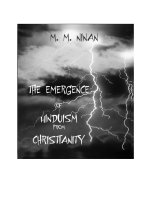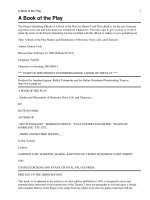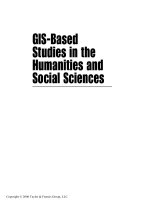hall stewart 22 the emergence of cultural studies and the crisis of the humanities
Bạn đang xem bản rút gọn của tài liệu. Xem và tải ngay bản đầy đủ của tài liệu tại đây (656.14 KB, 14 trang )
The Emergence of Cultural Studies and the Crisis of the Humanities
Author(s): Stuart Hall
Source:
October,
Vol. 53, The Humanities as Social Technology (Summer, 1990), pp. 11-23
Published by: The MIT Press
Stable URL: />Accessed: 25/08/2008 12:24
Your use of the JSTOR archive indicates your acceptance of JSTOR's Terms and Conditions of Use, available at
JSTOR's Terms and Conditions of Use provides, in part, that unless
you have obtained prior permission, you may not download an entire issue of a journal or multiple copies of articles, and you
may use content in the JSTOR archive only for your personal, non-commercial use.
Please contact the publisher regarding any further use of this work. Publisher contact information may be obtained at
/>Each copy of any part of a JSTOR transmission must contain the same copyright notice that appears on the screen or printed
page of such transmission.
JSTOR is a not-for-profit organization founded in 1995 to build trusted digital archives for scholarship. We work with the
scholarly community to preserve their work and the materials they rely upon, and to build a common research platform that
promotes the discovery and use of these resources. For more information about JSTOR, please contact
The
Emergence
of
Cultural
Studies
and
the
Crisis
of
the
Humanities
STUART HALL
If I
address the crisis
of
the
humanities
in
the
face
of
the
problem
of
social
technology,
I
want to
do
so first
of
all from
the
point
of
view
of
the
United
Kingdom,
and more
particularly
from
the
perspective
of the
growth
and
devel-
opment
of cultural
studies
such
as
it
is
in
Britain.
Specifically,
this will
be
from
my
own
experience
at
the
Centre for
Cultural
Studies,
where,
if
one
believes
in
origins,
the
term
cultural studies
first
appeared
in
its
modern
manifestation.
But this is
neither
a
search
for
origins
nor a
suggestion
that
Birmingham
was the
only way
to do
cultural studies.
Cultural
studies
was
then,
and has
been
ever
since,
an
adaptation
to its
terrain;
it has
been a
conjunctural
practice.
It has
always
developed
from
a
different
matrix of
interdisciplinary
studies
and
disci-
plines.
Even
in
Britain,
the three
or four
places
bold
enough
to
say
they
are
offering
courses
in
cultural studies
have
different
disciplinary
roots,
both in
the
humanities and the social
sciences.
There
should
be no
implication
in
my
remarks
that
Birmingham
did it the
right
way
or
even
that there
was
any
one
Birmingham
position;
indeed,
there
is
no such
thing
as
the
Birmingham
School.
(To
hear
"the
Birmingham
School"
evoked
is,
for
me,
to
confront
a
model
of
alienation in
which
something
one
took
part
in
producing
returns
to
greet
one as
thing,
in
all
its inevitable
facticity.)
My
own
memories
of
Birmingham
are
mainly
of
rows,
debates,
arguments,
of
people
walking
out of
rooms.
It
was
always
in
a
critical
relation
to
the
very
theoretical
paradigms
out of which
it
grew
and
to
the
concrete
studies
and
practices
it was
attempting
to
transform.
So,
in
that
sense,
cultural
studies
is
not
one
thing;
it has never
been one
thing.
In
trying
to
sight
the
problem
of
the
humanities
and
social
technology
from
the
standpoint
of cultural
studies a
particular
sense of
irony
takes
over
insofar
as
cultural studies
in Britain
emerged
precisely
from a
crisis in
the
humanities.
Many
of us
were formed in
the
humanities;
my
own
degrees
are
in
literature
rather
than
in
sociology.
When I
was
offered
a
chair in
sociology,
I
said,
"Now
that
sociology
does not
exist as
a
discipline,
I
am
happy
to
profess
it."
But
the
truth
is
that
most of us had
to
leave the
humanities in
order
to do
serious
work in
OCTOBER
it.
For,
at
the birth
of
cultural
studies,
the humanities
were
relentlessly
hostile
to
its
appearance,
deeply
suspicious
of
it,
and anxious
to
strangle,
as
it
were,
the
cuckoo
that had
appeared
in
its
nest.
So
I
want
to
begin
by saying
something
about
the
project
of cultural
studies
in
the face
of
that
hostility,
to
speculate
on
where
I think
that
hostility
came
from,
why
I
think
it
was
present,
and
why
I
think
it
continues
to
make
itself
felt.
In
so
doing,
I
want to
question
the
self-
presentation
of the
humanities
as
an
ongoing, integral,
integrated
exercise.
For
those
of
us in cultural
studies,
the
humanities have
never been or can
no
longer
be
that
integral
formation.
It
is
for this reason
that
in
Britain cultural studies
was
not
conceptualized
as
an academic
discipline
at
all.
For
me,
cultural
studies
really
begins
with the debate about the nature of
social
and cultural
change
in
postwar
Britain.
An
attempt
to address the manifest
break-up
of traditional
culture,
especially
traditional class
cultures,
it set
about
registering
the
impact
of the new
forms
of
affluence and consumer
society
on
the
very
hierarchical
and
pyramidal
structure
of
British
society.
Trying
to come to
terms
with
the
fluidity
and
the
undermining impact
of
the mass media and of
an
emerging
mass
society
on
this
old
European
class
society,
it
registered
the cul-
tural
impact
of the
long-delayed entry
of the United
Kingdom
into the modern
world.
The
attempt
to
describe and
understand
how
British
society
was
changing
was
at the center
of the
political
debate
in
the
1950s,
and
cultural studies was
at
this time
identified
with
the
first New Left. The first New
Left,
dated not 1968
but
1956,
was founded
around
such books
as The Uses
of
Literacy
by
Richard
Hoggart
(himself
not
a
university
professor
of
English
at
all,
but a teacher of
adult
working-class
students
in
what
was
called the extramural
department
of
the
university);
Culture
and
Society
by Raymond
Williams
(who
was
teaching
as an
extramural
tutor
in
the
south of
England);
and
The
Making
of
the
English Working
Class
by
Edward
P.
Thompson
(who
was an
extramural teacher in
Leeds).
I
myself
was
working
as an extramural
teacher,
once
I
left
the
University
of
Oxford,
in
and around
London. We thus came
from a
tradition
entirely marginal
to
the centers
of
English
academic
life,
and our
engagement
in
the
questions
of
cultural
change
-how to understand
them,
how
to describe
them,
and how
to
theorize
them,
what
their
impact
and
consequences
were
to
be,
socially-were
first reckoned within
the
dirty
outside
world.
The
Center for
Cultural
Studies
was the
locus
to
which
we retreated when
that conversation
in
the
open
world
could
no
longer
be continued:
it
was
politics
by
other
means.
Some of
us-me,
especially
-had
always
planned
never to
return to
the
university,
indeed,
never
to
darken
its doors
again.
But, then,
one
always
has
to
make
pragmatic adjust-
ments to where real
work,
important
work,
can
be
done.
The
attempt
to
found
the Center for
Cultural
Studies
was
originally
Richard
Hoggart's
project.
Once he was
named a
professor
of
English
and
brought
inside
the
University
at
Birmingham,
what
he
said,
in
effect,
was
that
he
would
like
to continue the work he was
doing
in
The
Uses
of
Literacy,
in
which he
12
The
Emergence
of
Cultural
Studies and the Crisis
of
the Humanities
had
written about
his own
working-class
background
and
the
way
in
which
working-class
culture was
being
transformed
by
the new
forces of mass
culture.
The
department
responded
with disbelief and
dismay.
Having
appointed
him,
they
couldn't
say
he
couldn't
do
it;
but
they
certainly
did
say
they
weren't
going
to
give
him
any
money
with
which
to do it. For that
he would
have to
go
outside
the
university. Having
raised a
very
small
amount
of
money,
he was
able
to
hire
me as
a
Research
Fellow to tend
the
cultural
studies
pasture,
as
it
were,
while the
mainstream
work of the
department
went
on.
I
had
to
pay
my
dues
by
doing my
lectures
on
Henry
James
to
undergraduates,
lecturing
on the
American
novel,
which was
my
own area
of
research,
and
running
the
gauntlet
of
the
University.
Now,
with the
appearance
of the Centre
for
Cultural
Studies,
this
gauntlet
was an
enfilade
fire from both
sides. On
the
day
of our
opening,
we
received
letters
from members
of
the
English department
saying
that
they
couldn't
really
welcome
us;
they
knew we were
there,
but
they hoped
we'd
keep
out of
their
way
while
they got
on with
the work
they
had
to do.
We received
another,
rather
sharper
letter from the
sociologists
saying,
in
effect,
"We have
read
The
Uses
of
Literacy
and
we
hope
you
don't
think
you're
doing
sociology,
because
that's
not
what
you're doing
at all."
Having
entered this
very
tiny space
we asked
ourselves
questions
like: What
shall
we call
ourselves?
Shall
it be
an
institute?
On
looking
around,
we
clearly
weren't
institutionalized
in
any
way,
so
that name
wouldn't
do.
We
thought
we'd
call ourselves a
center because
that
might
rally
some
troops
and
make
us
look a
bit
more
impressive
on the academic
campus.
But we
were
clearly
far
from
any
center.
Throughout
the
1960s,
in
fact,
we were
moved
from
one
temporary
residence
to
another,
in and
out of a series
of
Quonset
huts,
provisional
struc-
tures built
during
the
war and
intended
to
last
about
six
months
-
until
the
German
bombers
came. But
they
never
hit
the
Quonset
huts on
the
Birmingham
campus,
and we
occupied
them
all
in
sequence.
In
case we
had
any
doubts
about
our
marginal
status
in
the
field,
this
physical
displacement
and
the
space
in
which
we
operated
symbolized
it
for
us
daily.
To
understand
this dubious
reception
is to
realize
that in
the
English
context
the
humanities,
insofar
as
they
were ever
illuminated
by
a
general
statement
about
program
or
intentions,
were
conducted
in
the
light,
or
in
the
wake,
of
the Arnoldian
project.
What
they
were
handling
in
literary
work
and
history
were
the
histories and
touchstones
of the
national
culture,
transmitted
to
a
select number
of
people.
The
archetypal
figure
who
inherited
that
project
and
who
lived
it for
us in
my undergraduate
years
was,
of
course,
F.
R.
Leavis.
Leavis
is
ambiguously
placed
in
relation to this
project
because
the
establishment
at
Cambridge
did
not
receive him
to its
bosom;
he
too lived a
marginal
kind of
existence
there.
Nevertheless,
Leavis saw
himself
committed
to
the
project
of
tending
the
health
of the
language
and the
national
culture,
of
nurturing
the
refined
sensibilities of
that
small
company
of
scholars
who
alone
could
maintain the
vigor
of
culture
and
13
OCTOBER
cultural
life;
it
was
in
their
keeping,
the
keeping
of a
particular literary
elite.
Leavis
himself
gives
an
account
of what the conversation of
those
attending
to
the
cultural
life of
a nation
is
like
in
pedagogic
terms: "It
is
an
exchange
of
conversation
in
which
one
speaker says
to the
other,
'This is
so,
it is not?"'
The
question
"This is
so,
is it not?" has to do with at what
exact
page
in
The
Portrait
of
a
Lady
Henry
James
stops
being
part
of the
great
tradition
and
begins
to be
part
of
something
else.
That is what the
question
means. And such
a
question appears
to
invite comment
as
to
whether,
in
fact,
the
contention is
so.
Yet,
to
picture
Leavis
asking
this
question,
imagine
the
archetypal
Lawrencian,
the
nonconformist
scholar, who,
whenever
he visited
Oxford,
always
unbuttoned
his
shirt,
baring
his chest
as it were
to
the
slings
and
arrows of
outrageous
fortune
from
the Oxford
establishment,
and
imagine
Leavis
turning
his
beady, parrot-
like
eyes
on him and
saying
"This is
so,
is
it not?" The
idea
of his
having
the
temerity
to
say
"No,
it's
not,"
is unthinkable. It was a
very
controlled
conversa-
tion
among
a
very
controlled
number of
people.
Only
five
or ten
people
at
Downing College
were admitted to the circle of those
who were
sufficiently
attentive
to what Leavis
called
"these words on the
page;
these
words
in
this
order
on
the
page,"
and had the
sensibility
to care for
and nurture it.
This
is
a
caricature,
of
course;
yet
it is
also a
paradox,
because
nearly
all of
us
who entered
the
cultural
studies
project
were
actually
formed
in
the
Leavisite
ethos.
Raymond
Williams,
for
instance,
does
a
chapter
on
Leavis
in
Culture
and
Society.
Or,
Hoggart,
in his Uses
of
Literacy,
writes
about
working-class
culture
as
though
he
were
reading
a
text
in a
Leavisite
way. Having
no
other
sociological
method,
he uses
that
of
practical
criticism,
applied,
as it
were,
to real life.
What is
more,
there was
an educational
project
deeply lodged
in
the
Leavis
project
because
Leavis and
the
Scrutiny
group
paid
careful
attention
to
winning
over
and
transforming
English
teachers
in
the schools. In
fact,
some of
the
finest work
of
the
Scrutiny
group
was
accomplished by
mobilizing
secondary
school
teachers
in
relation
to
English
teaching.
Indeed,
Leavis
himself,
though
he
had
a
highly
conservative
definition of
culture
and of
the manifest
destiny
of
English
studies
in
relation to
the
national
culture,
was nevertheless different from
many
other
scholars in
the
humanities,
and
this is
why
he
was hated at Oxford:
because
he
actually
took
questions
of
culture
seriously.
He
thought
it
mattered what
happened
to
the
culture,
whereas
they
thought
the culture would take care
of
itself.
So,
in
fact,
our
relation
to
Leavis included
admiration
for
the
seriousness
with
which
he
understood
that
questions
of
culture and cultural
change
lay
at the
very
heart of
social
life
and
could not be
refused,
that the issues of
language
were
central
to
the
understand-
ing
of
the national
culture,
and that
any
serious
scholar
must
be
engaged
in
the
question
of
the nature of
language
and
what it is
saying.
The
fact
that
Leavis
adopted
a
conservative
position
on
these
questions
and
was
driven to an
elitist
educational
program
-
in
which
only
about five
scholars in
each
generation
could
really
have a
vocation for
this attention
to
culture
-
was
one side of
the
14
The
Emergence
of
Cultural
Studies and the
Crisis
of
the Humanities
coin;
the
depth
of his
engagement
with cultural
questions
was the
other. As
his
neophytes,
albeit
in
a critical
sense,
we took
our
distance from
his
educational
program
and from his conservative
cultural values.
But our
respect
for the
other
aspect
of
his
project
came from
the fact that no
other
place
could be
found
within
the humanities that
took
these
questions
seriously.
The
Leavisite
influence can
be
gauged
by
the
fact that
Raymond
Williams's
Culture and
Society
is
really
a
rereading
of the
core
"English
Moralists"
course at
Cambridge. Required
for all
literary
students,
this
course
was the
only point
at
which
they engaged
the broader
cultural and
philosophic
traditions
out of
which
works
of
literature
arose. Culture and
Society
is
Williams's
attempt
to
read
the
tradition
of the
English
moralists,
including
the moral
element
in
English
litera-
ture,
from a different
vantage:
the
vantage,
as
it
were,
of
cultural
studies. In
turn,
that
project
made
possible
The
Long
Revolution,
which
humanities
depart-
ments
in
England
received
with total
incomprehension.
They
said he
wrote
with
incredible
difficulty
about
simple questions;
that he
appeared
to be
a
kind of
Marxist but he couldn't
actually
name a
single
Marxist
concept;
that his
work
was
written
in
code;
that it
had
its own
profound
difficulties
of
comprehension;
and,
above
all,
that it seemed
he
thought
he was
theorizing.
For a
serious
professor
of
English,
who
had
paid
his
dues
in
the real
world
teaching
adult
students,
and
who
had
finally
won his chair at
Cambridge,
to
produce
a
book
with the
title
The
Long
Revolution was a
scandal,
one which
Williams,
in
his
very
seriously
moderated
way,
never
quite
outlived.
When cultural studies
began
its
work
in
the 1960s and
'70s,
it
had,
there-
fore,
to
undertake
the task of
unmasking
what it
considered to be
the
unstated
presuppositions
of the humanist tradition itself.
It had to
try
to
bring
to
light
the
ideological assumptions
underpinning
the
practice,
to
expose
the
educational
program
(which
was
the
unnamed
part
of
its
project),
and to
try
to
conduct
an
ideological critique
of the
way
the humanities and the
arts
presented
themselves
as
parts
of
disinterested
knowledge.
It
had,
that
is,
to
undertake a work
of
demystification
to
bring
into the
open
the
regulative
nature and
role the
human-
ities
were
playing
in
relation to the national culture.
From
within the
context of
that
project,
it becomes clear
why people
wrote us rude
letters.
That
represents
the
negative
side
of
how we
had to
distance
ourselves
from
some
of the
ongoing
traditions
in
the
humanities. The
positive
work
one
then
went on to do
in
the Center had still
to
be
invented. No
place
existed
at
that
stage,
whether
in
the
social
sciences
or in
the
humanities,
where one
could
find
the
concept
of
culture
seriously
theorized.
Contemporary
cultural
forms
did
not
constitute
a serious
object
of
contemplation
in
the
academic
world.
And
the
political
questions,
the
relationships,
complex
as
they
are,
between
culture
and
politics,
were not a matter considered
proper
for
study,
especially by graduate
students.
The
strategy
of
the Center for
developing
both
practical
work
that
would
enable
research to be done
in
the
formations of
contemporary
culture
and
the theoretical models that would
help
to
clarify
what was
going
on
was
designed
15
OCTOBER
as
a
series
of raids
on
other
disciplinary
terrains.
Fending
off
what
sociologists
regarded
sociology
to
be,
we raided
sociology.
Fending
off the
defenders
of the
humanities
tradition,
we
raided the
humanities. We
appropriated
bits of
anthro-
pology
while
insisting
that
we
were
not
in
the
humanistic
anthropological
project,
and so on.
We
did
the
rounds
of
the
disciplines.
What we discovered was that serious
interdisciplinary
work
does not
mean
that
one
puts
up
the
interdisciplinary flag
and
then has
a
kind
of
coalition
of
colleagues
from different
departments,
each
of
whom
brings
his
or
her
own
specialization
to a kind
of
academic
smorgasbord
from
which
students can
sample
each of
these
riches
in turn.
Serious
interdisciplinary
work
involves the
intellec-
tual
risk
of
saying
to
professional
sociologists
that what
they
say
sociology
is,
is
not
what
it
is.
We
had to
teach
what
we
thought
a kind
of
sociology
that
would
be of
service to
people
studying
culture would
be,
something
we
could
not
get
from
self-designated
sociologists.
It was
never
a
question
of
which
disciplines
would
contribute to the
development
of
this
field,
but of how
one
could
decenter
or
destabilize a
series
of
interdisciplinary
fields. We
had to
respect
and
engage
with
the
paradigms
and
traditions of
knowledge
and
of
empirical
and
concrete work
in
each
of
these
disciplinary
areas
in
order
to
construct
what
we called
cultural
studies
or
cultural
theory.
Not all the models
and
approaches
we
needed were
to be
found
somewhere
in
the
disciplinary
mix
of
a
standard
English
university,
so,
in
part,
the
curricu-
lum
of
cultural
studies,
or its
literature,
had
to
be made
up
from
other
sources.
Increasingly,
the books
people
read in
cultural
studies
were
not
only
salvaged
from other
people's
bookshelves,
but were
taken
from
traditions
that
had
had
no
real
presence
in
English
intellectual
life.
Cultural
studies would
not
have
oc-
curred,
and
certainly
would
not
have
survived
the
1970s,
without the
enormous
program
of
translation
of
European
work
undertaken in
the late
'60s
and
'70s
by
New
Left
Review.
The
project
of
the
second New
Left was
crucial,
for,
along
with a
few
other
publishers
of
that
time,
it
translated
books not
yet
available
to
us.
For
the first
time
it
brought
us,
in
English,
the
major
works
of
the
Frankfurt
School,
then
of
Benjamin,
and
then of
Gramsci.
Without
those
"Ur-texts,"
which
no
one
was
reading
inside
the
academy,
cultural
studies
could
not
have
developed
its
project:
it
could not have
survived;
it
could
not have
become a
field
of
work
in
its
own
right.
At
this
particular
period-and
I'm
talking
now
mainly
about
the
1970s,
which
is
my
own
time
at the
Center for
Cultural
Studies in
Birmingham-
the
development
of
cultural
studies had
two
practical
ramifications.
First,
a
word
about
pedagogic practice,
about
how
the
work
was
actually
done.
It
was
ob-
viously
impossible
for us to
pretend
that we
represented
anything
like a
discipline
since
there were
so
few
of us
hired as
teachers
and
lecturers in
cultural
studies.
During
my
time
at
Birmingham,
the
total
complement
of
teachers of
cultural
studies was
three,
along
with
one
Research
Fellow;
all
the
other
names
that
are
now
known
as
the
leading lights
of
cultural
studies
were
graduate
students.
In
16
The
Emergence
of
Cultural Studies and the Crisis
of
the Humanities
this
context,
it
was
impossible
for us to maintain for
very long
the
illusion that
we
were
teaching
our
graduate
students
from some
established
body
of
knowledge,
since
it
was
perfectly
clear to them
that we
were
making
it
up
as we
went
along:
we
were
all in
the
game;
we
were
apprentices
to cultural
studies
trying desper-
ately
to
keep
just
one
step
ahead of them. And so the normal
pedagogic
relations
where the teacher
is
supposed
as the
keeper
of
wisdom and
students
respond
to
the
question
"This is
so,
is
it
not?" with that kind of
compulsive
drive that
requires
them to
say,
"Of
course,
of
course,"
was
simply
impossible.
Consequently,
and
for a
series of additional
reasons
I
won't
go
into,
we
did
not think that
what had to be done was
clear-cut
from
the
first
day
we
opened.
Gradually
it
emerged
that
we
had to have
working
seminars in
which
the
theory
itself
was
actually
developed.
We could not do
graduate
work
as
I
think
it
is
done
both
in
England
and the United
States,
where
the first
chapter
of a
dissertation
is
a
review
of
the
existing
literature
which
implies
that the
candidate knows
the
books,
has a
complete bibliography,
every
item
of which
he or
she has
read,
etc.
What
was
the
bibliography
of
a
cultural
studies
thesis?
Nobody
knew.
Secondly,
it was not
possible
to
present
the work of
cultural
studies as
if
it
had
no
political
consequences
and no form
of
political
engagement,
because
what
we
were
inviting
students
to do was to do
what
we
ourselves had done:
to
engage
with
some real
problem
out there
in
the
dirty
world,
and
to
use the enormous
advantage given
to
a
tiny
handful
of us in
the
British educational
system
who
had
the
opportunity
to
go
into universities
and
reflect
on
those
problems,
to
spend
that
time
usefully
to
try
to understand how
the world
worked.
Therefore,
if
someone
came to me
asking
me
to
suggest
an
interesting
project
that could be
done
in
cultural
studies,
that
person
would
not
be a
good
candidate
for us
at the
Center,
because it
was not someone
who
had
already
engaged
with
and
become
committed to a field
of
inquiry
which
seemed,
to that
person,
to
matter.
(I
myself
still don't
understand
how
people
drive
themselves
through
to
the ends
of
their
Ph.D.s
on
problems
they
don't think matter.
I
know how
they
start,
because
the
lure of a
proper
career and a
job
at the end
will
always
motivate one
to
begin,
but
how one
manages
to
finish
it three
or four
years
later,
I
do
not
comprehend.)
So,
from the start we said:
What are
you
interested
in?
What
really
bugs
you
about
questions
of
culture
and
society
now?
What do
you
really
think
is a
problem
you
don't
understand out
there
in
the terrible
interconnection
between
culture and
politics?
What
is
it
about the
way
in
which
British
culture is now
living
through
its
kind of
postcolonial, posthegemonic
crisis
that
really
bites
into
your
experience?
And then
we will find a
way
of
studying
that
seriously.
The
question
of
studying
seriously
is
important
because,
rightly
or
wrongly,
the Center did not
say:
"All
you
have to do is
to
be a
good
activist and
we will
give
you
a
degree
for it."
Rightly
or
wrongly,
and
especially
in
the
1970s,
the
Center
developed,
or tried to
develop,
what
I
would call
a
Gramscian
project.
That is
to
say,
our intention was to
address the
problems
of
what Gramsci
called
"the
national
popular":
how
it was
constituted;
how
it
was
being
transformed;
17
OCTOBER
why
it
mattered
in the
play
and
negotiation
of
hegemonic
practices.
And
our
intention
was
always
to do
that
in
the
most
serious
way
we could. In
that sense
we
remained
what
people
sometimes called
"beetle-browed Leavisites." It was
a
serious
project.
We took to
heart
the
Gramscian
injunction
that the
practice
of
an
organic
intellectual
would
have to be
to
engage
with
the
philosophical
end
of
the
enterprise,
with
knowledge
at its
most
testing.
Because
it
mattered,
we
had
to
know more than
they
knew
about
our
subject
at the same
time as
we took
responsibility
for
translating
that
knowledge
back
into
practice
-the latter
oper-
ation
was what
Gramsci
calls
"common
sense."
Neither the
one nor the
other
alone
would do. And that
is
because
we
tried,
in
our
extremely marginal
way
up
there
on the
eighth
floor in
the
Arts
Faculty
Building,
to think of
ourselves
as
a
tiny
piece
of
a
hegemonic
struggle.
Just
one
tiny
bit of
it. We
didn't have
the
illusion
we
were
where the
game
really
was.
But we knew
that the
questions
we
were
asking
were of
central relevance to the
questions
through
which
hegemony
is
either
established
or
contested.
I
therefore think
it
is true
to
say
of
the
Center's work
that it
always
insisted
that intellectuals themselves
take
responsibility
for
how
the
knowledge
they
produce
is
then
transmitted to
society;
that
they
can't
wash
their
hands
of
the
game
of
translating
knowledge
into
the
practice
of
culture.
We
never
flattered
ourselves that
because
we
were
studying
postwar
youth
cultures we
were
nothing
but street
boys.
The
remorseless
march
of
the
division of
knowledge
and
the
gap
between
theory
and
practice
is
not to
be
overcome
by
wishing
to do
so or
by
declaring
that
it
has
just
happened.
The
gap
between
theory
and
practice
is
only
overcome in
developing
a
practice
in
its own
right.
It
is a
practice
to
bring
together
theory
and
practice.
It had to
be
done.
And
the
vocation
of
intellectuals
is not
simply
to turn
up
at
the
right
demonstrations
at the
right
moment,
but
also
to alienate that
advantage
which
they
have
had
out
of
the
system,
to
take
the
whole
system
of
knowledge
itself
and,
in
Benjamin's
sense,
attempt
to
put
it at
the
service
of
some
other
project.
What the
movement
needed
from
us
as
part
of
their
struggles
of
resistance
and
of
transformation,
then,
was
what we
had
in
our
heads.
The
Center's
project
was
thus
never
what
I
would call
a
populist
intellec-
tual
project.
It never
suggested
it would
be
easy.
It
never
implied
it
could
be
done
without
engaging
with
theoretical
paradigms.
Of
course,
the
foregoing
is
not the
whole
story
of
the
Center's
work;
nevertheless,
I
want to
leave
it at
that
for
now in
order
to
turn
to
the
contempo-
rary
context. We
are,
in
Britain,
currently
going
through
our
crisis
of
the
system
of
higher
education. In
the
particular
area of
the
humanities
and
social
sciences,
and of
education
more
generally,
this
crisis
began
with
what is
now
known
as
"the standards
debate,"
in
which
two
university
English
professors,
Copt
and
Dyson,
broke
the
silence
that had
been
developing
in
the
universities
about
what
they
called
the
high
illiteracy
out
there
in
the
world.
The
high
illiteracy
had
to
do
with
the
inability
of
the
students
they
were
getting
to
read
and
write;
and
it
had
to
do
with
that
typical
figure,
a
stereotype
of
the
1960s,
called in
England
"the
18
The
Emergence
of
Cultural
Studies
and the
Crisis
of
the
Humanities
polytechnic
lecturer."
These
are
people
reared
in
the
'60s who
couldn't
get
jobs
in
the universities
at the
decade's
end
but
who,
with
the
expansion
of
the
polytechnic
system
(the
bottom
end of
our
system
of
higher
education),
were
then recruited
into
polytechnic
humanities
and social
sciences
departments,
to
be
regarded
by
the arts and humanities
establishment
as
not much
more
than
'60s
barbarians.
The
attack
on
higher
education is
not restricted
to
these
limited
targets
any
longer.
Under
Thatcherism,
in
the Baker
Education
Bill,
there
is a
major
and
frontal
assault
on
the
free
public-education
system
itself,
on
the
schooling
system
as well
as on that of
higher
education.
We
are
in
the
throes of
a
debate
as
to
whether,
for
the
first
time,
the
English
educational
system
should
have a
national
curriculum. On
the one
hand,
this
question
represents
the
attempt
to
computer-
ize
and
business-manage
the entire
world;
but,
on
the
other,
it
has
as its
central
focus the
question
of
what is
being
taught
in
two
areas:
literature and
history.
Because,
as
I
think
Mr.
Baker
says
-having
himself
produced
a
book
of
national
English
verse
which
might
be
the
primary
text of
the
national
curriculum in
the
English
department
itself-
the
attention
to
literary
language
and
its
impact
on
the
question
of who
can or
cannot
speak
English
effectively
is a
central
matter
for
the future and survival
of the
United
Kingdom
as
a
civilized
society.
As
for
history,
it
was
in
one
sense
a
matter
of
why
it is
students do
not
know
which
king
followed
which
queen
and,
in
a
very
different
sense,
why
they
now
believe
(under
the
influence
of
the '60s
barbarians,
of
course)
that
it
might
be
important
for
English
students
of
history
at the
school,
undergraduate
or
graduate
level,
to
know
something
about
the rest of the
world,
any
part
of
the
rest
of
the
world.
Such a
dreadful
misunderstanding
as this
had to
be
dispelled;
one had
to
be
returned to
the
proper
understanding
of
the
national
destiny
as it
is
recorded,
embalmed,
and
enshrined
in
English
history.
This
project
has
ambiguous
and
curious
allies,
like
the
Prince
of
Wales.
He
is a
very
ambiguous
figure;
from
day
to
day,
in
our
attempt
to
develop
a
conjuncture
of
politics,
we don't
know
whether
we
should
be for
the
prince
or
against
him.
But
when
he
says
things
like,
"The
people
I
meet
these
days
can't
speak
English
properly;
they
can't
write
English
properly;
they
have
no
knowl-
edge
of
the
essential structure of
an
ordinary
English
sentence,"
we
must
have
some
doubts.
Now,
from
the
ancient
universities,
the
cry
is
going
up
that
the
students can
hardly
be
taught
because,
of
course,
the
schools
do
not
provide
them with
basic skills. "In
all
of
my
time,"
said
Professor
Norman
Stone,
a
distinguished
professor
of
history
at
the
University
of
Oxford,
"standards
fell"
(though
he
doesn't
indicate whether
he
had
any
responsibility
for the
decline).
Professor
Hugh
Ropold,
who
is also
one of
our
most
eminent
professors,
offers
himself as a kind of
flying
doctor,
battling
single-handedly
with
what
he
calls
the
educational
pandemic-an
epidemic
raised
to
universal
proportions.
Having
assured
himself
of the
truth
of a
colleague's
diagnosis
at
Oxford of
creeping,
or
galloping,
illiteracy
among
university
students,
he
suggests
two
remedies.
He
19
Hans Haacke.
Taking
Stock
(Unfinished).
1983-84.
(Photo:
Zindman
/
Fremont.)
The
Emergence of
Cultural Studies and the Crisis
of
the Humanities
himself
has so far
abjured
the construction
of a
list
in
the manner of E. D.
Hirsch,
but
has
offered instead the ten
commandments
for
graduate
students. And for
undergraduates
he has one recommendation: a
steady
and
unswerving
reading
of
Churchill
and
Orwell. Correct
spelling, punctuation,
and an
elementary
grasp
of
syntax
and sentence
structure now seem to be
luxuries,
even
among
the so-called
educated
classes,
with a
dismaying
number
of
university graduates
unable
to
master these
essentials
of a
bygone age.
All this is
part
of
Thatcherism;
it has to do with a
profound
crisis of national
identity,
of the national
culture;
it's
about
the erosion and
decline of the
United
Kingdom
as a
nation-state,
about the threats Britain
now feels
itself
facing,
first
of all
from its own
regions,
second of all
from
Europe,
thirdly
from
America,
fourthly
from
Japan,
and
fifthly-and
especially-from
its own
population.
It is
under threat
from the
"others,"
and
the "others"
accumulate
in
the
cities;
they
accumulate
around the
margins;
they
accumulate
in
Wales and
in
Scotland;
they
accumulate
in
the trade
unions. It's the
attempt
of
Thatcherism to
discover who
can
really
still
be
English;
it's
a
tiny
handful of
almost the
same size as
the number
of
people
who
gathered
in
Downing College
under F.
R. Leavis
-and
they
may
indeed
be
exactly
the
same
people.
Because,
as
Thatcherism has
made the
round
of
British
society,
it
has,
one after
another,
excluded
everybody.
Thatcherism has
a
place
for
women,
of
course,
if
they respect
the
traditional
family
role;
otherwise
they
don't
belong.
And,
through
the exercise of
this
logic,
one after
another,
all
of
us have been excluded
from
belonging
to
the national
community
at all.
It has
to
do with
a sense of unease and
uncertainty
that can
only
be
shored
up
by
a
national
curriculum;
with the enormous
displacements
of a
deeply
centered and
hierarchical traditional culture
which has
been
blown
apart
by
world
migration,
by
fragmentation, by
the
rise of
the
margins,
by
the
struggles
of the
margins
to
come
into
representation, by
the
contestation of
the
margins
for
cultural
power,
by
the
pluralization
of
ethnicity
itself
in
English
society.
Within the context
of
these
"threats,"
what we
are
seeing
is
not the trium-
phant
march of
the
human sciences and
the
glorious
destiny
of
the
liberal
humanities;
rather,
the humanities are invoked
as the
last bastion
in
a
primarily
defensive
operation.
Thatcherism itself
is a
defensive
operation.
It
asks:
Who
now can be
English?
What
is
it like to be
English?
Can
one be
English
and Black?
English
and Muslim?
English
and
feminist?
English
and
socialist?
English
and
Welsh?
This
is the
degree
to which
Thatcherism sees
itself
imprisoned
in
an
increasingly
tight
and
tiny
island. This
has
nothing
to do
with
the
question
of
whether Thatcherites
hold
power;
of course
they
do.
The
notion
that,
because
they
don't
really
have
anywhere
to
stand,
they're
going
to
abdicate
their
position
at the center of the culture and
tell the rest of
us to take
over is a
kind
of
illusion
that intellectuals sometimes have.
They
aren't
simply
going
to
get
out of
it;
they
are
engaged,
instead,
in
an
enormous
struggle
to
define
what
Britain can
mean in
the twentieth
century
if
it
is
not to be
the center of a
huge
commercial,
economic,
and
imperialist
empire.
Where is
there
for
the
English
people
to
stand,
and
what
21
OCTOBER
could
be the
identities
they
could claim
in
the
twenty-first
century
that
might
enable
them
to
have
any
kind
of
self-respect?
In
the search to
find
an
answer
to
that
question,
we have taken
off
to the South
Seas
to defend the
Falklands;
we
have to
defend
something
in
order to assure ourselves
that this dark
heroic
destiny
is
still
a
possible
future for
us. And
these
might
be
regarded
as
mere
fantasy
excursions-except,
of
course,
that real
people
die
at
either end of
the
process.
If
cultural
studies
came into
existence
in
order
to
understand
cultural
and
social
change
in
British
society
since the
war,
what I
have
just
been
describing
is
the
current,
contemporary
form
in
which
that
cultural
crisis
continues
to work
itself
out
in
the United
Kingdom.
The
vocation of
cultural
studies
has been
to
enable
people
to
understand
what
is
going
on,
and
especially
to
provide
ways
of
thinking,
strategies
for
survival,
and
resources
for
resistance to all
those
who
are
now-
in
economic,
political,
and
cultural terms
-excluded from
anything
that
could be called access to
the national
culture of
the
national
community:
in
this
sense,
cultural
studies
still has
as
profound
a
historical
vocation
as
it ever
had in
the
1960s
and '70s. But on the
other
hand,
in
relation to
the
mass
education
of
students,
both
in
higher
education and
elsewhere,
cultural
studies
is,
as an
institutional
form,
very
minor.
But the
humanities
and
the
arts are
not.
And
indeed the contestation that
cultural studies
was
partly responsible
for
putting
on
the
agenda
has
been taken
into the
humanities
themselves.
The
notion
that
the
humanities
disciplines
are an
integral
field
that has
the
option
to
decide
whether
or not to become social
technologies
is,
in
my
view,
hopelessly
utopian.
The
cultural crisis now cuts
into and
through
the
humanities
from
beginning
to
end:
the social
technologies
of
the
other side
have
already
invaded
the
humanities,
summoning
them to the
barricades to
defend an
old
project.
And
the
humanities
have thus to decide on
which
side
of
this
particular
form of
cultural
politics
they
are
going
to
engage
in
the
future.
That
crisis,
it seems
to
me,
runs
through
most
arts
and
humanities
depart-
ments
in
British
universities
and,
looking
on
from a
distance,
it is
my
observation
that
they
run
through
cultural
studies,
communications
studies,
and
the
humani-
ties
in
the
United States as well.
The
people
who
understand
what the
problem
is
for the
humanities are
not to be
numbered
in
terms of
their
institutions,
their
programs,
or
what their
departments
call
themselves.
In
the
United
States,
for
instance,
"cultural studies" has
become an
umbrella
for
just
about
anything,
and
to
ask
whether
someone is
doing
cultural
studies or
not is
unlikely
to
evoke
the
answer
you
want.
Similarly,
those who
are
doing
formal
deconstruction
of
the
most
elegant,
mannered kind
are
perfectly
in
touch
with
the
advanced
frontiers
of
theoretical
work,
yet
their
contribution
to
the
resolution
of the
cultural
crisis
I
have
just
named is
nonexistent. The
question
is
not
whether
one
is
a
deconstruc-
tionist,
but
whether
these new
theoretical
techniques
and the
new
positions
opened
up
by
feminism
and
by
Black
struggles,
as
well
as
the
new
theoretical
positions
opened
up by
the
postmodernist
and
the
poststructuralist
debates,
can
22
The
Emergence
of
Cultural Studies and the Crisis
of
the
Humanities
be
won over
and
drawn into
an
understanding
of
the
larger
historical/political
project
that
now confronts the humanities. It is
perfectly possible
to
write
elegant
treatises
on the "other" without ever
having
encountered
what "otherness"
is
really
like
for
some
people actually
to live.
It is
perfectly
possible
to
invoke the
postmodernist
paradigm
and not understand
how
easily postmodernism
can
become
a kind of lament
for
one's own
departure
from
the
center of
the world.
These crises cut
through
existing
new
practices;
they
intersect the humani-
ties;
they
bisect cultural
studies;
they
interrupt
people's
careers;
they destroy
people's
reading
lists;
they
cut
through
the
canon;
they
fire
cannons
at
one
another
rather than
establishing
them.
They
are
a
series
of
interruptions
in
the
peaceful
life
of the humanities. There
may
be some idea
that, now,
late in
the
day,
the humanities
could still
ask
questions
like:
Shall we
respond
vigorously
to
the
assault
on our
economic and
funding
base? Shall we
venture
even a
toe into
these troublesome
waters? Shall we
take
thought
for
the
morrow?
But the
notion
that
such
questions
are
open
for us to ask and
that we have
the time
to
reflect
extensively
on a
reply
to
them-that,
it seems
to
me,
is the
last of
the
humanist
illusions.
23









